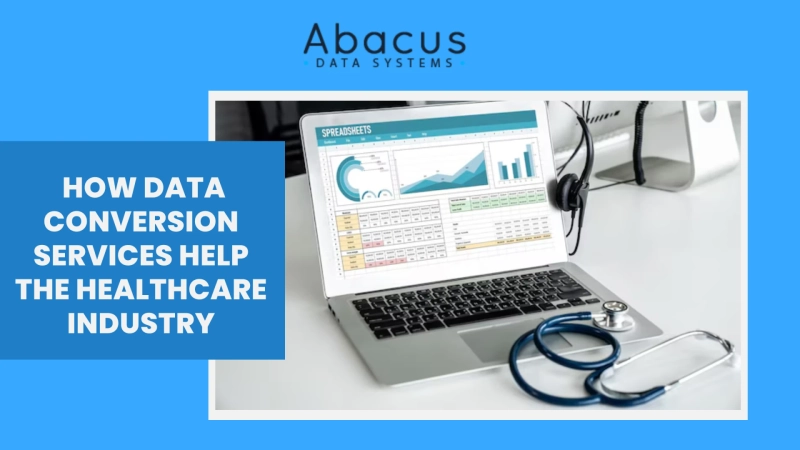With the rapid advancements in innovative technology and the increasing availability of online digital tools, businesses of all types, including the healthcare industry, can generate large volumes of data daily. For improved decision-making, transforming patient paperwork into digital records is vital in the fast-paced medical field.
Data conversion services play an essential role in helping hospitals, clinics, and medical practices transition from paper files and legacy electronic systems to streamlined digital formats.
Healthcare institutions can focus on delivering excellent quality patient care by partnering with specialized medical data conversion services.
At the same time, expert teams can handle the conversion of advanced legacy system information into modern formats.
This comprehensive guide examines the unique ways the data conversion process supports informed decision-making in the healthcare and medical industries.
The Growing Importance Of Digital Records
As healthcare becomes increasingly technology-driven, paper documents, charts, and bulky file storage rooms are no longer sustainable. An electronic health record provides immediate access to a patient's complete medical history.
An electronic medical record in one department can be integrated into an EHR system used across multiple locations.
When all medical records are unified on a single platform, certified healthcare professionals can gain a more comprehensive view of patient information. This unification supports better decision-making and improved patient care.
Common Hurdles To Effective Data Management
Many healthcare organizations operate with a combination of old software and paper archives.
A legacy system may store lab results in one format while additional medical billing information resides elsewhere.
This segmentation hinders data quality and introduces the risk of misplaced or lost medical records.
Without consistent data management protocols, medical staff may need to manually search multiple data repositories to locate basic information, such as allergy history and previous medical treatments.
Moreover, patient data in paper form can be challenging to analyze and search. Medical prescriptions and handwritten notes are subject to interpretation errors.
Optical character recognition tools and scanners can misread handwriting, further eroding data quality.
When the integrity of healthcare data is exposed, these errors can have serious consequences for patient safety and regulatory compliance.
With the use of proper tools and precise techniques, medical professionals can resolve these data conversion hurdles with a customizable solution.
Strategies To Use Medical Data Conversion Services For Decision Making
The Complete Data Conversion Process Explained In a Simple Manner
A robust data conversion process starts with a complete assessment of current assets. Conversion teams catalog all physical and electronic files, categorizing them by type and priority.
They then develop a unique mapping strategy to ensure each piece of information finds its proper place in the new system.
During scanning, paper documents are digitized into high-resolution images. For instance, metadata is applied to index each file, making future searches simple for patients.
Afterwards, text extraction tools convert images into highly structured data. The expert reviewers verify accuracy, correcting any misreads before final upload.
This manual quality assurance step is crucial for safeguarding protected health information PHI and maintaining compliance with privacy regulations.
Once digital records have been validated, they are imported into the target electronic health record environment. However, a final audit confirms that every record EMR has been transferred without loss or corruption.
Potential Benefits For Healthcare Organizations
Strengthened Compliance and Data Security
Practically converting files into secure digital repositories after medical data conversion reduces the risk of stolen or lost records. The advanced data encryption and role-based access control permissions protect sensitive information.
Audit trails document who accessed each file and when. By selecting to outsource data conversion services, healthcare organizations benefit from specialized security protocols tailored to medical records and protected health information PHI.
Increased Access To Patient Information
When patient information is digitized, authorized staff can recover it from any location at any time. Clinicians and medical practitioners no longer struggle to track down charts.
Lab technicians and doctors can directly view previous test results. Administrators in the healthcare facility can generate reports on demand. This immediate access results in faster treatment and diagnosis.
Improved Operational Efficiency
A streamlined workflow eliminates redundant tasks. Employees spend less time searching for and filling documents. With a single source of information, scheduling appointments and coordinating care across various departments becomes more efficient and streamlined.
A variety of quality time saved on administrative tasks can be redirected toward direct patient care and customizable services.
Advanced Scalability and Future Proofing Technology
A digital record system can grow in tandem with the medical organization. When patient panels expand or new service lines are introduced, the infrastructure remains robust and adaptable.
The same data conversion framework can monitor additional medical records without disrupting daily operations.
Healthcare organizations can adopt new tools and functions as technology grows, confident that their foundational data is ready for further processing.
Better Data Quality And Analytics
A complete data conversion service ensures that each data retains its context and accuracy. Consistent formatting makes it possible to identify a large volume of healthcare data.
Insights into treatment results, re-admission rates, and resource utilization can be obtained from clean digital records.
Healthcare service providers, doctors, and decision-makers can use these analytics to improve patient outcomes.
Choosing The Right Partner
Selecting a provider for an electronic health record conversion needs careful evaluation and multiple factors to take into consideration.
Search for an outsourcing partner with a proven track record in migrating legacy system content into the mainstream electronic health records EHRs.
Verify their experience handling diverse document types, ranging from lab slips and radiology images to physician notes and medical prescriptions.
You can ask about quality assurance and compliance measures of an external outsourcing data conversion services partner.
A trustworthy service provider will be transparent about their data conversion service methodology and will provide clear deliverables and timelines.
It is also necessary to note that they offer ongoing support even after the initial conversion. Clinics and hospitals may require regular updates, batch uploads, or corrections.
A long-term partnership ensures that new patient records and historical files remain synchronized and accessible.
Real World Impact On Healthcare Professionals
Nurses, doctors, and administrative staff primarily monitor multiple screens and systems. A unified electronic health record simplifies their digital environment.
In real time, nurses can update patient charts near the bedside using smart devices like mobiles and tablets. Lab technicians and physicians can review primarily imaging results on high-definition screens without leaving the patient examination room.
Intense patient care coordinators can send referrals electronically, reducing the risk of lost paperwork. Each primary step toward complete digital integration supports healthcare professionals in delivering attentive patient care.
Driving an Improved Patient Care Experience
When the administrative burden is reduced, lab technicians and clinicians have more time to focus on patient interaction. In the medical industry, patients benefit from shorter waiting times, fewer duplicate tests, and a more coordinated care experience.
Instant access to historical data after data conversion services means that patient care teams can identify the latest trends in each patient’s condition and intervene proactively. Multiple efforts to manage patient health become more effective and personalized.
Furthermore, families appreciate transparent communication and instant access to records. The centralized digital patient portals allow individuals to review their electronic health records, schedule appointments, and message their care team securely.
This level of engagement encourages patients to take an active role in their overall healthcare journey.
Improve Patient Care and Better Decision-Making With Data Insights Using Data Conversion Services
Healthcare data conversion is a critical step in modernizing the industry's infrastructure. The data conversion process lays the foundation for better data quality and safer patient care, from scanning paper charts to migrating legacy system entries into a comprehensive EHR system.
By partnering with experts to outsource data conversion services, healthcare organizations can focus more on what matters most: delivering timely, informed treatment to each patient.
When the digital records become the norm, the industry moves closer to a future where every medical record is available at the click of a button and every decision is backed by accurate and complete information.



